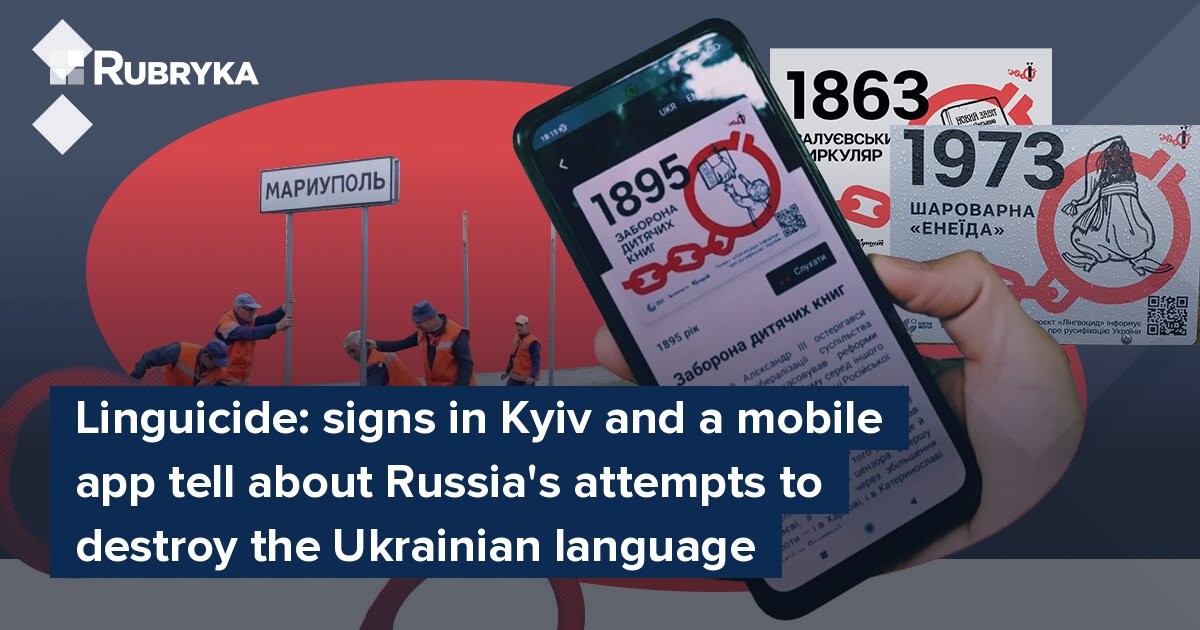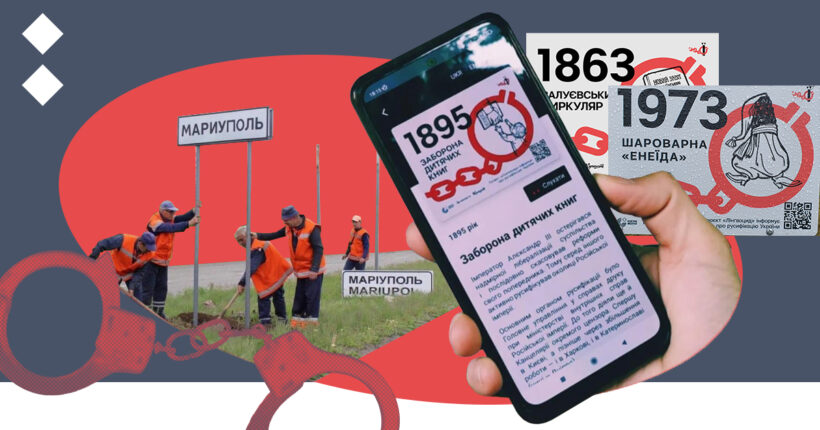
What is the problem?
For almost 400 years, Russia has tried to turn Ukrainians into "malorosy," or little Russians — a concept regarding people living in Ukraine as a part of Russia. The Ukrainian language has come under particular pressure because language is one of the most essential features of national identification. Ukrainian was banned, restricted, and simplified; false theories were spread, calling it just a variety of Russian. Those who tried to defend the language were persecuted, imprisoned, and killed.
The murder of language, successively embodied by the Russian Empire and then by the USSR, continues in modern Russia. Last year, Taras Kremin, the Commissioner for the Protection of the State Language, announced more than 200 cases of linguicide of the Ukrainian language in the occupied territories. In his report at the International Conference of the European Federation of Language Institutions on October 13, 2022, he emphasized that discrimination, persecution, and repression against Ukrainian citizens based on language is one of the Kremlin's policies of genocide of Ukrainians.
What is the solution?
Today, when most Ukrainians have finally gotten rid of their illusions about the 'elder brother' Russia, it is essential to remember and understand how Russians have for centuries been engaging in linguicide in Ukraine. Retaining memory is necessary to understand the causes and consequences of what is happening now, to be aware of how the past affects the present, draw conclusions, and to gain experience.
To show the entire path of oppression of the Ukrainian language by Russia, an interactive memorial titled Linguicide was created in Kyiv. The NGO "Valentnist.Rethinking" aims to tell people about the scale of forced Russification of Ukrainians. The creators of the memorial are sure that its visitors must come to the conclusion themselves why it happened historically that there is a large Russian-speaking population in Ukraine.
How does it work?
Tell the truth and dispel myths
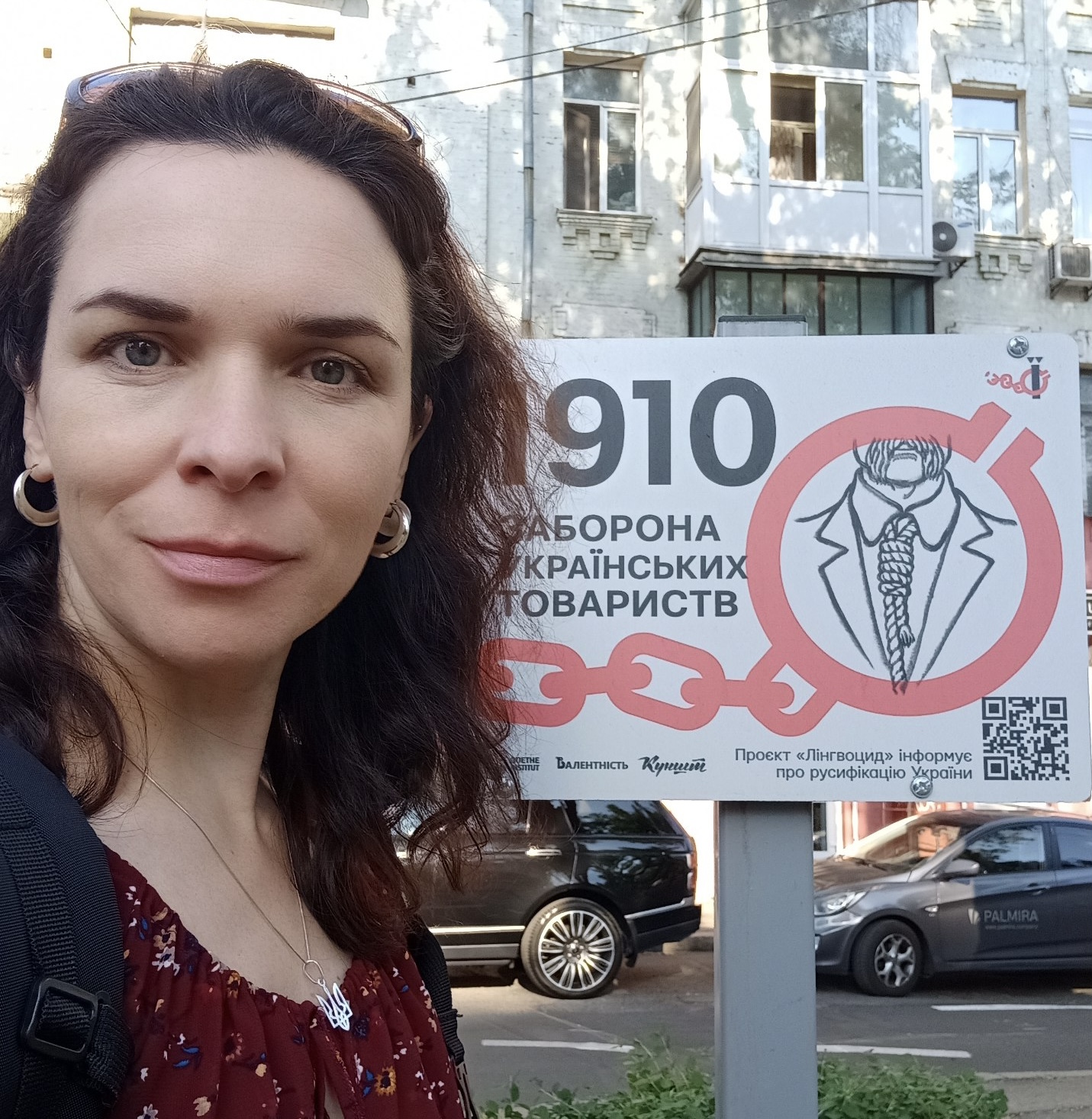
The author of the Linguiocide project, Valentyna Merzhievska, stands next to one of the plaques installed in the capital
"The idea of creating the project Linguicide was born from the experience of working in education. I have been working with teenagers for many years, for whom the issue of finding their own identity is particularly relevant," says Valentyna Merzhievska, the founder of the Linguicide project. "If throughout the world teenagers are defined by their professional orientation, attitude to religion, or gender orientation, in Ukraine, in addition to these issues, there are also issues of cultural affiliation and language choice. These criteria are not defined by default for any generation, and are a personal choice of each. Since I had the experience of changing the language of communication and now I help some of my students in this, organizing the history of bans on the Ukrainian language was born from this."
The educator is sure that understanding the essence of this phenomenon eliminates the need to take something on faith, removes unnecessary emotionality around the issue, and allows people to make balanced decisions.
The immediate impetus for the project was a visit to Berlin, where many memorial practices are implemented. In particular, there is an interactive Holocaust memorial about the chronology of the oppression of the Jews, realized in the form of a mobile application and signs in the city. This format seemed to the founder of the Linguicide project convenient to use and possible to implement. And, as Merzhievska herself assesses the result, these assumptions have come true.
In the summer of 2022, Merzhievska and another activist Iryna Martynenko created the NGO "Valentnist. Rethinking" and began looking for an opportunity to bring the idea of an interactive memorial to life in Ukraine. The idea was financed by the Goethe-Institut in Ukraine and the magazine Kunsht as part of the Mediengeist disinformation accelerator. The creation of an interactive memorial to the oppression of the Ukrainian language in Ukraine Linguicide was also supported by the Kyiv City Council.
You can learn about the history of oppression of the Ukrainian language simply during a walk in Kyiv
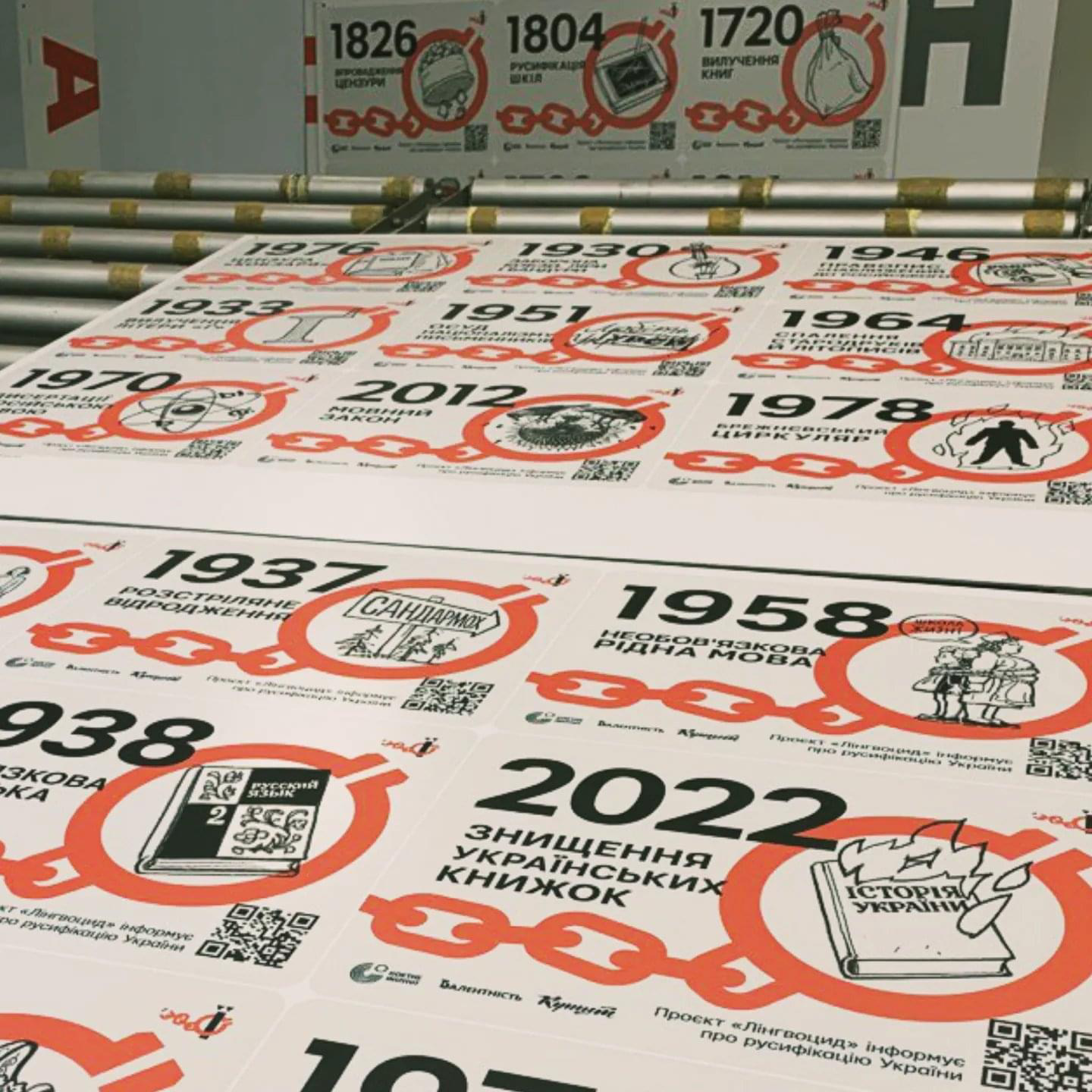
Printing information boards for the Linguicide project.
For this, the creators of the interactive memorial Linguicide developed 38 graphic plates with dates – although, unfortunately, there are more events in the history of oppression of the Ukrainian language. Ready-made signs were installed in central Kyiv — near places of daily life — to illustrate the oppression of the Ukrainian language associated with them: bans on Ukrainian schools, books, and religious services. Orysia Demska, a historian of the Ukrainian language, helped Merzhievska compile the list of prohibitions. The Linguicide project is also based on Viktor Kubaychuk's "Chronology of language events in Ukraine: the external history of the Ukrainian language."
The project covers the events of the last 400 years, from 1627 to 2022, starting with the period when the Ukrainian language separated from Russian linguistically; until the current events, when Ukraine is completing the separation politically.
"We have grouped some events by category. For example, there is only one plaque about the introduction of censorship, but this was not a single event but a series of events described in more detail. Therefore, almost every plaque mentions not only one event but several related events," adds Merzhievska.
According to the project's author, during the creation of the memorial, it was possible to discover many myths about language prohibitions. For example, there is a legend about shot Kharkiv students who demanded to take exams in Ukrainian, or a tale about a shot congress of kobzars. Facts support none of these events.
"Ultimately, we wanted to create a true picture of linguicide. We continue to cooperate with historians to clarify information. The mobile application format allows us to make these changes in real time," says Merzhievska.
You can read more about the prohibitions from each sign or listen in audio format by scanning the QR code. There is also an invitation to install the application to see routes and learn about other prohibitions.
In the Linguicide mobile application (available from the App Store or Google Play), you can collect locations, read descriptions of each of the prohibitions, and find excursion routes and audio accompaniment. Currently, five routes are available through the streets of Kyiv, which last from 30 to 90 minutes; however, you can also make your own route).
According to the creators of the interactive memorial, all this will help to see Russification as a conscious, consistent policy over the centuries — and to begin just as consciously and consistently getting rid of it.
Who will benefit from the Linguicide app?
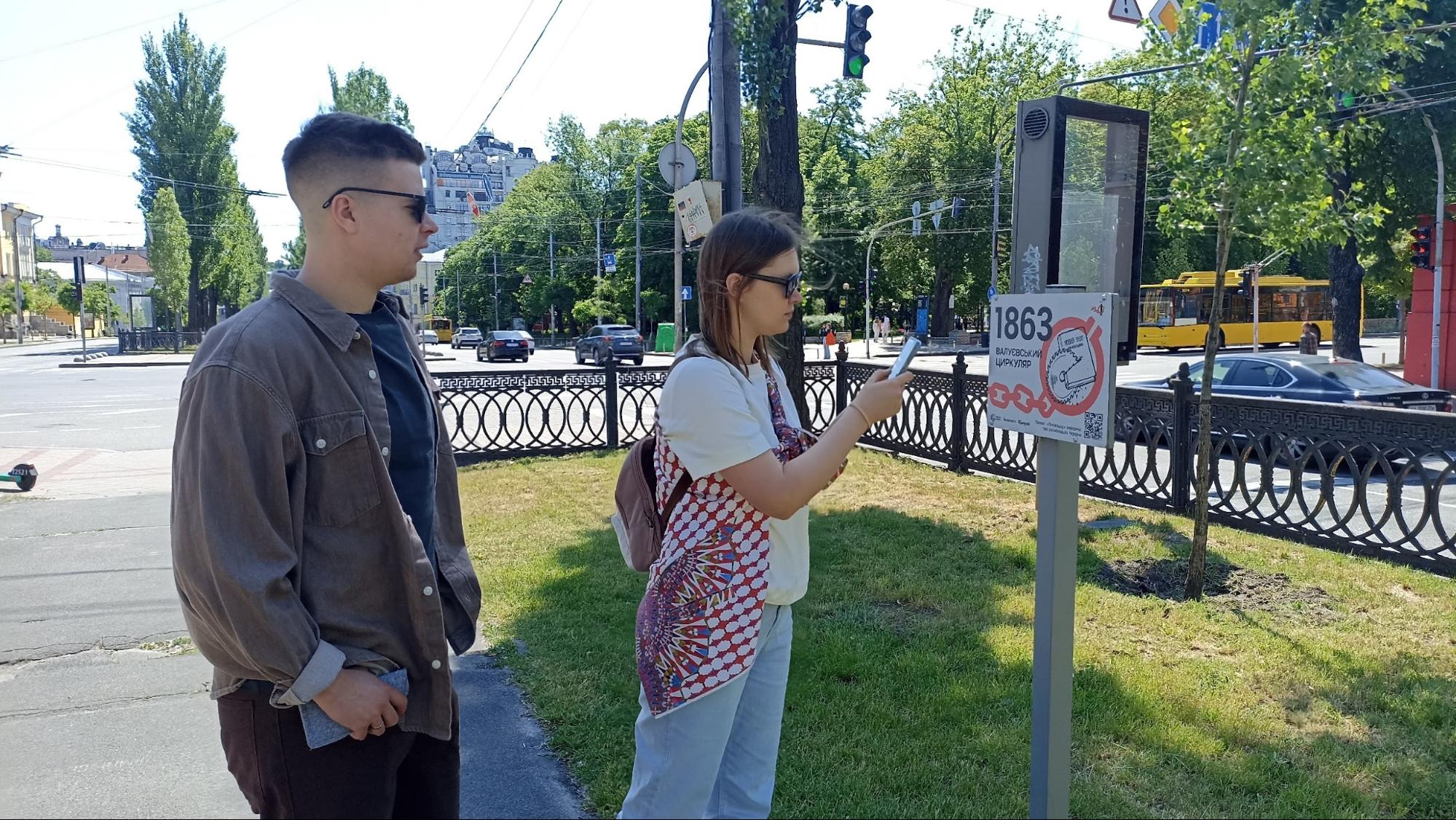
The content of the ban from each sign can be read or listened to in audio format by scanning the QR code.
Since the language issue concerns a very wide range of people, the project can interest many, Merzhievska believes.
- First, it is aimed at people who have either decided to change their language of communication from Russian to Ukrainian, or are just daring to do so because it adds arguments about why it is crucial.
- Tour guides can also use it. Even if they lead tourists on their own routes, the interactive memorial Linguicide plaques are an additional attraction to pay attention to.
- The project routes will also be appropriate as part of the educational process for children. The authors of the project even made the audio from the project freely available at the request of teachers, who have already evaluated the project format and call the idea of involving more senses in learning very successful. Education traditionally relies mainly on sight and hearing, but adding bodily, kinesthetic sensations to the learning process can give more impressions, and help with retention. When a walk, city smells, changing spaces, and lighting are added to the images and audio accompaniment, it creates a more profound experience than a simple lecture or presentation could create.
- The routes run through the picturesque downtowns of Kyiv, where you can just go for a walk or even a date, adds the project's author.
It is worth noting that the application can be downloaded in Ukrainian, English, and Russian. "Many assume that all people in Ukraine understand the Ukrainian language. However, some have never studied Ukrainian and do not have a circle of communication. The perception of information in the Ukrainian language requires such efforts for them as it does for someone in English," explains Merzhievska. "It is possible to understand, but for this, you need to make an effort. You also need to try to change your views on this or that issue. We would like to make this path a little easier for those who have just begun to think about the role and meaning of language. Perhaps the older generation will not change their language of communication, but if they rethink their attitude to the language, they can create conditions for their children to speak Ukrainian."
The NGO "Valentnist.Rethinking" is discussing cooperation with organizations that contribute to creating a Ukrainian-speaking environment. For this purpose, the idea of researching one's own genealogy from the point of view of language was added to the project.
Remember the past for the sake of the future
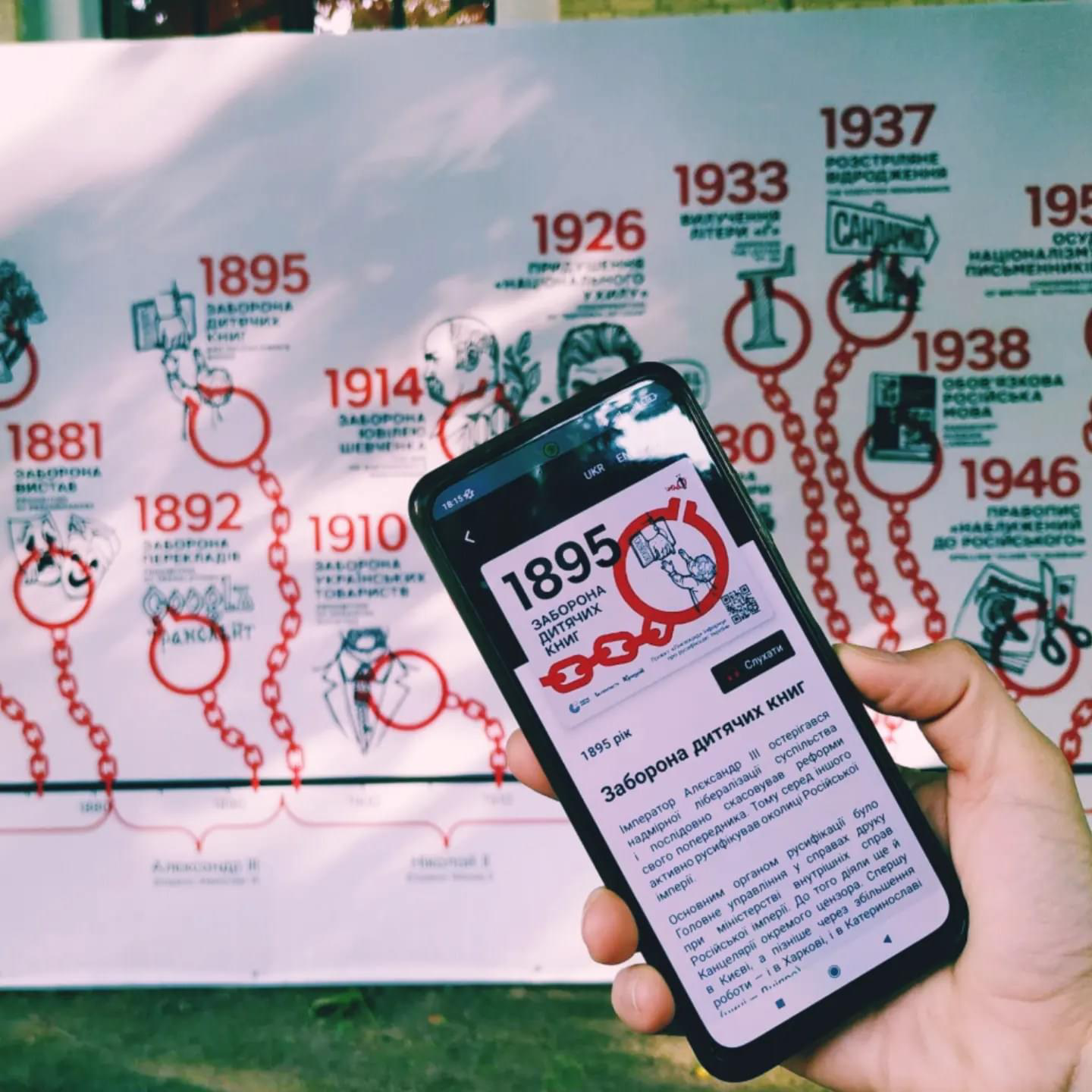
This is what the Linguicide project looks like on a smartphone.
Merzhievska calls the implementation of the project "extreme." The team first learned about the finding opportunity from the NGO "Valentnist.Rethinking" in the first half of October, and the project had to be completed by the end of November. The narrow time window demanded quick and very accurate decisions during the project's implementation.
"The war, in general, speeds up processes a lot," says Merzhievska, the author of the Linguicide project. "I don't want to postpone anything for the future because it is too uncertain." In July 2022, Merzhievska came up with an idea. In August, they registered as a non-governmental organization, and in September, the team applied for a grant, which they won in October. Already by November, they had created and presented the project. Amid all the shellings and blackouts, this was another challenge.
The Linguicide project has the name of a memorial, but, in the opinion of the author of the idea, it is too early to talk about the linguicide of Ukrainian as being in the past.
"In my opinion, a memorial is not a sign of something from the past. It is a reminder, a place of memory, a provocation for thinking about a certain issue. We cannot say that linguicide is in the past, if only because even our project mentions the very recent events in the territories occupied by Russia. However, in my opinion, the better we remember our past, the more likely this memorial will not have to be continued in the future," says Merzhievska.
She notes that for her personally, this project was proof that life goes on: "With the beginning of the full-scale invasion, I left Ukraine with my children for several months, but I felt very out of place. I never wanted to leave Ukraine and live in another country, so I wanted to return." Linguicide was the first project she started upon her return. "It returned to me a sense of the value of what I do, returned a sense of my own way, from which I almost strayed."
Even more useful solutions!
What's next?
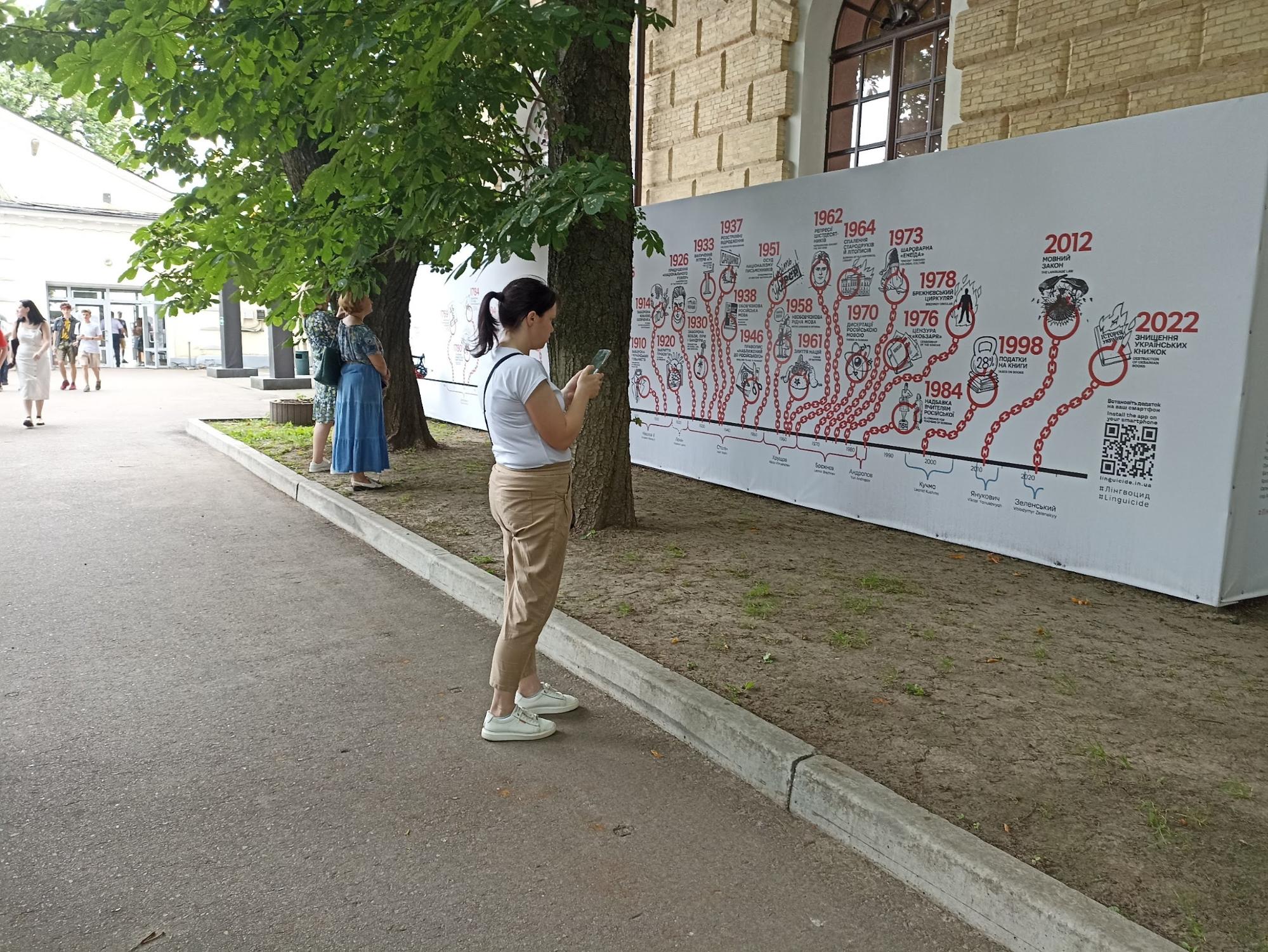
A banner with a timeline of language bans at Book Arsenal 2023.
The project continues to develop. In June 2023, at the Book Arsenal Festival, the creators of the interactive memorial presented a huge banner with a timeline of language bans so that attendees could clearly see in which periods and under whose rule the bans intensified and when there was a relative lull.
In addition, the project team is considering options for expanding the project to other regions because the prohibitions mentioned in the Linguicide project were spread on the territory of the Russian Empire and, later, the USSR. However, parts of Ukraine were also formerly a part of other states — the Austro-Hungarian Empire, the Republic of Poland, Romania, and Czechoslovakia. There, the oppression of the Ukrainian language was different. Merzhievska believes it would be very interesting and useful to investigate these issues. They decided to start from Lviv. Currently, the project is at the stage of coordinating details with the city council.
How can we all help the project?
Merzhievska, the author of the idea,, admits that the project needs constant support to scale the project, and to maintain it— two placards have already required replacing since launch. So, if you want to support the existence of this project materially, you can contact them here.
If you want such an interactive memorial to appear in your city, and you are ready to help find locations and communicate with local authorities, you should contact the project team.
Newsletter
Digest of the most interesting news: just about the main thing



